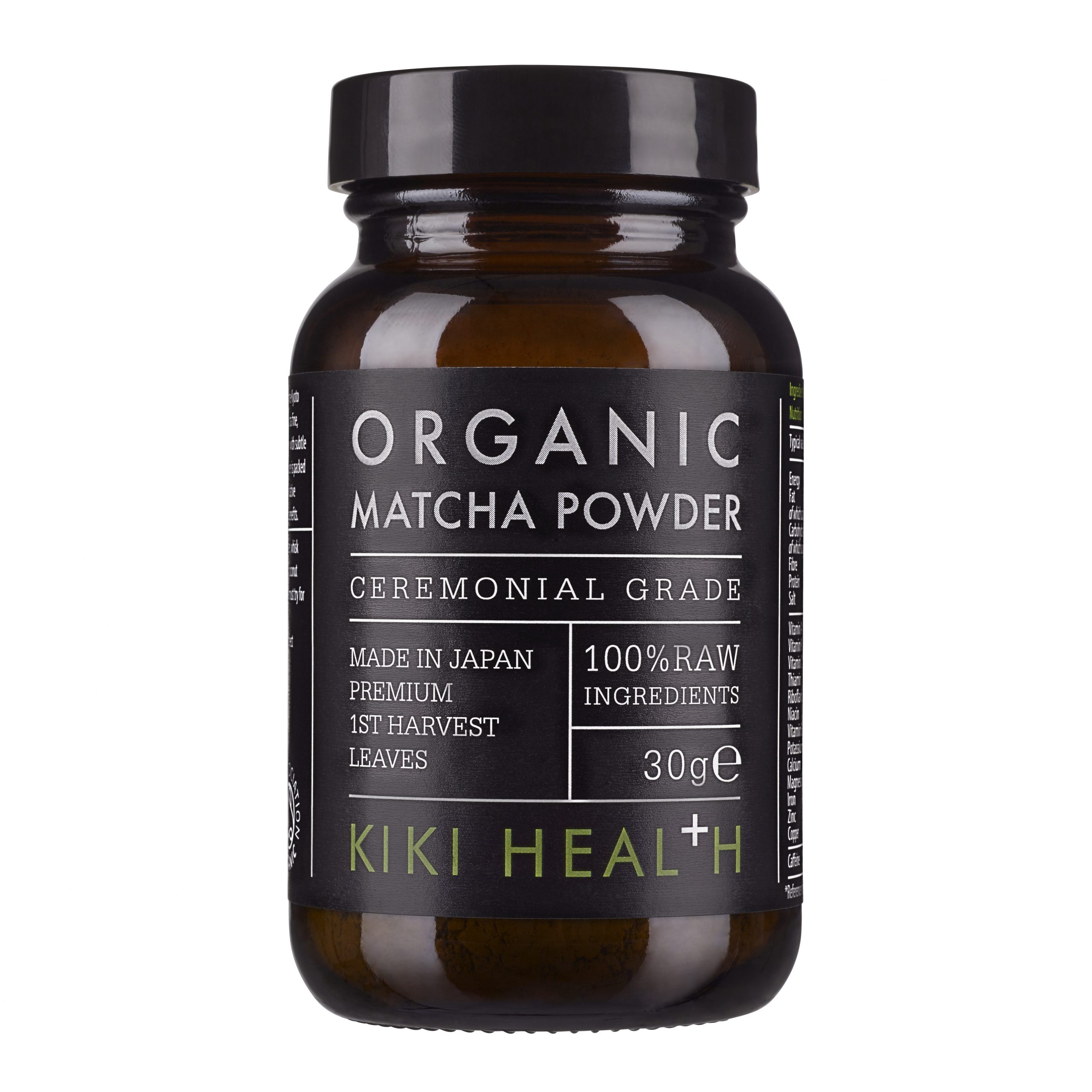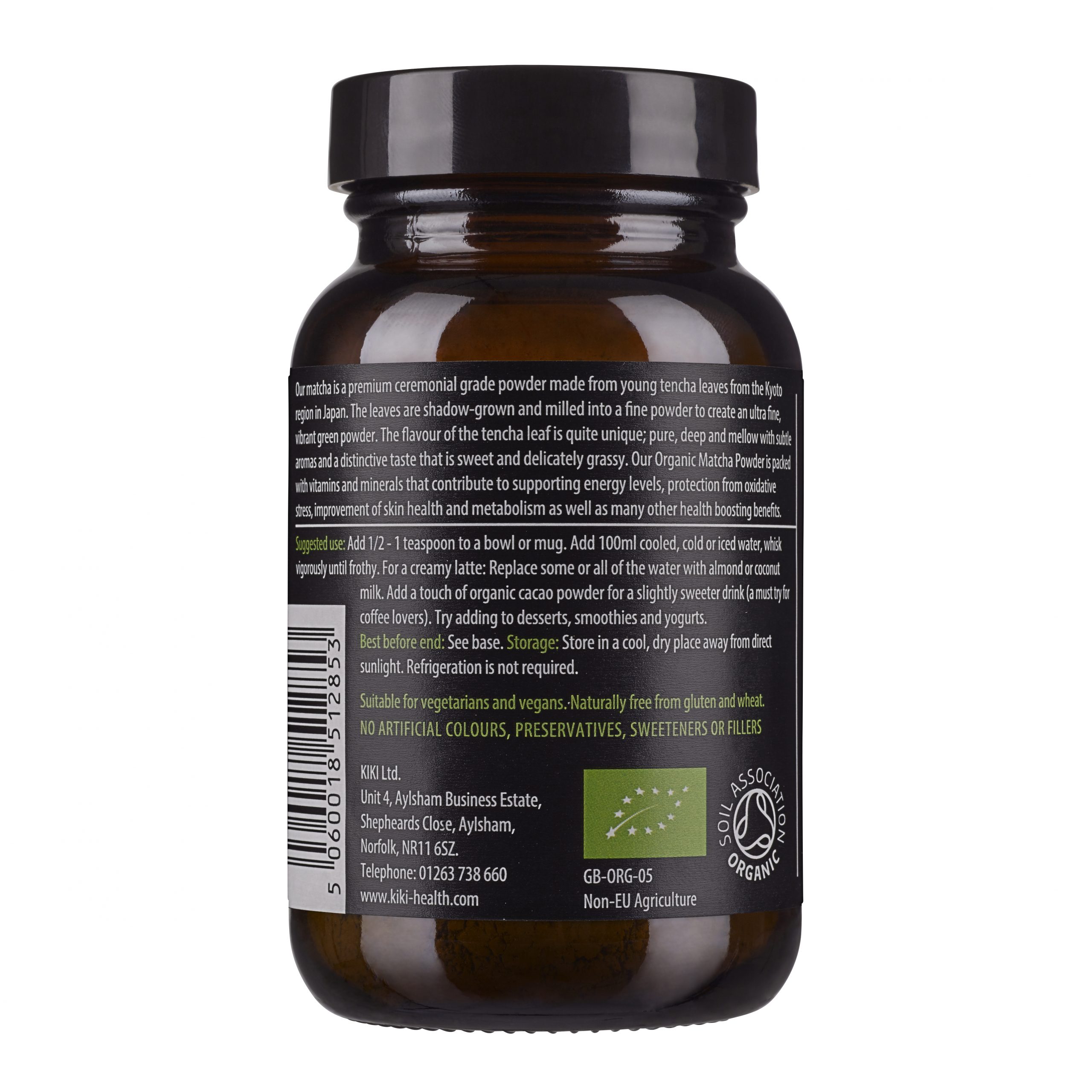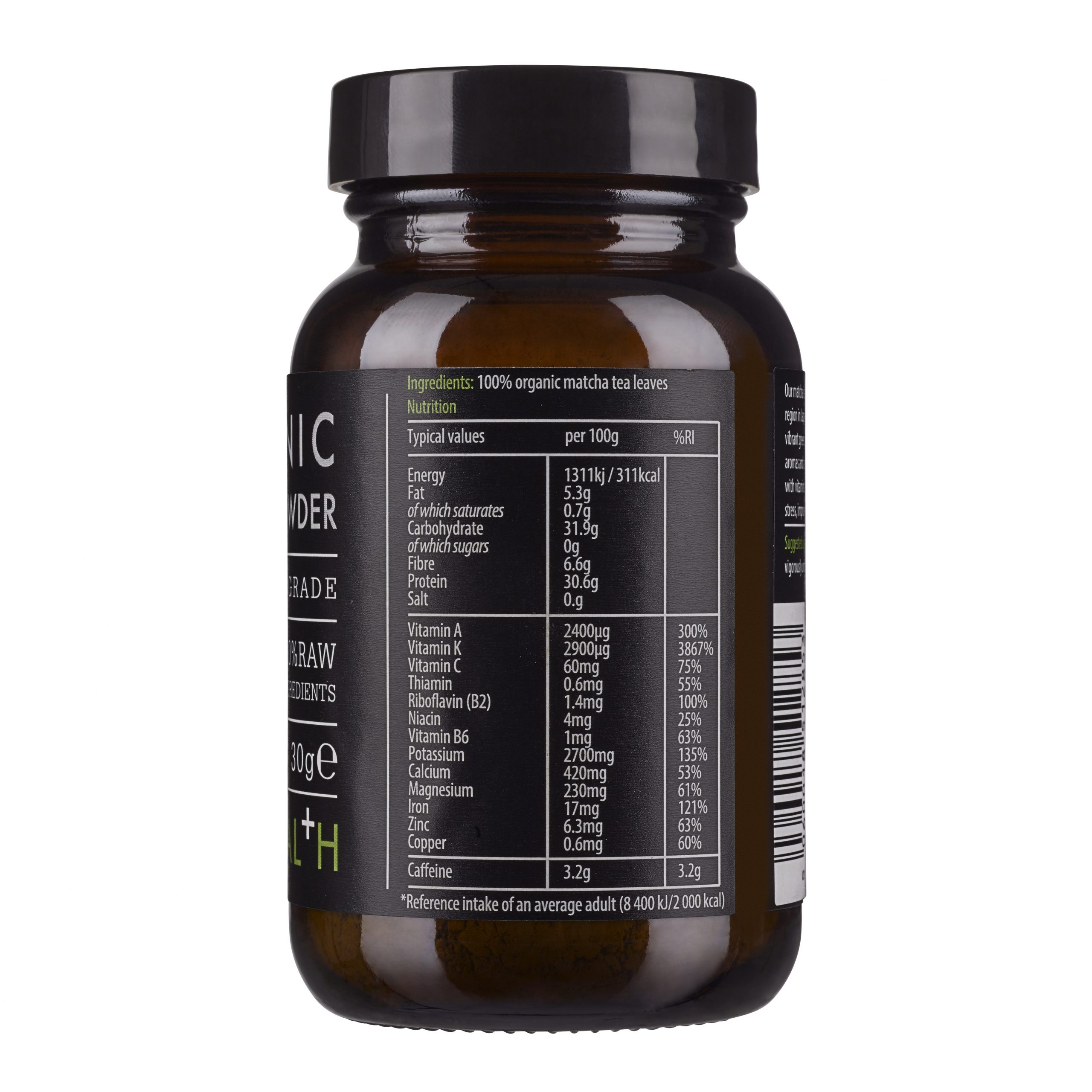Description
Our Organic Matcha Green Tea Powder is exclusively grown in the ancient city of Kyoto in Japan.
Japanese tea culture was developed in Kyoto and used for nearly a millennium in tea ceremonies.
Grown and produced close to the river in fertile rich soil, using traditional techniques to grow the highest grade Matcha possible.
Only the first young, most tender leaves are picked in each spring harvest. They are shadow grown – avoiding direct sunlight, which stimulates chlorophyll growth. They are then milled into a fine powder to create an ultra-fine, vibrant green powder.
Thanks to the special conditions and growing techniques, our Matcha is smooth and mellow, with a subtle and noble aroma.
Our Organic Matcha Powder is naturally packed with high levels of vitamins and minerals that contribute to a wide range of benefits.
Our Organic Matcha Green Tea Powder is delicious in both hot and cold latte’s
Features:
KIKI Health’s Organic Matcha Powder is a ceremonial grade Matcha, the highest quality green tea powder available. It is made from the youngest tea leaves, with the stems and veins entirely removed, promising a very delicate taste and extremely fine texture.
✓ Premium Ceremonial grade
✓ Shade-grown tea leaves
✓ Bursting with essential vitamins and minerals
✓ Grown in Japan
✓ Handpicked from the first spring harvest
Nutritional Benefits:
Vitamin A
- Vitamin A contributes to normal cell differentiation
- Vitamin A contributes to normal function of the immune system,
- Vitamin A contributes to maintenance of normal skin
- Vitamin A contributes to mucous membranes
- Vitamin A contributes to maintenance of normal vision
- Vitamin A contributes to normal metabolism of iron.
Vitamin C
- Vitamin C contributes to normal energy-yielding metabolism
- Vitamin C contributes to the reduction of tiredness and fatigue
- Vitamin C contributes to normal Psychological functions
- Vitamin C contributes to the regeneration of the reduced form of vitamin E
- Vitamin C contributes to normal energy-yielding metabolism
- Vitamin C contributes to the maintenance of the normal function of the immune system
- Vitamin C contributes to the protection of DNA, proteins and lipids from oxidative damage
Vitamin K
- Vitamin K contributes to maintenance of normal bone
-
Vitamin K contributes to normal blood coagulation
-
Vitamin K contributes to and normal function of the heart and blood vessels
Calcium
- Calcium contributes to normal blood clotting
- Calcium contributes to normal muscle function
- Calcium contributes to normal neurotransmission
- Calcium contributes to the normal function of digestive enzymes
- Calcium has a role in the process of cell division and specialisation
- Calcium is needed for the maintenance of normal bones
- Calcium is needed for the maintenance of normal teeth
- Calcium contributes to normal energy-yielding metabolism
Riboflavin
- Riboflavin contributes to normal energy-yielding metabolism
- Riboflavin contributes to normal functioning of the nervous system
- Riboflavin contributes to the maintenance of normal mucous membranes
- Riboflavin contributes to the maintenance of normal red blood cells
- Riboflavin contributes to the maintenance of normal skin
- Riboflavin contributes to the maintenance of normal vision
- Riboflavin contributes to the protection of cells from oxidative stress
- Riboflavin contributes to the normal metabolism of iron
- Riboflavin contributes to the reduction of tiredness and fatigue
Iron
- Iron contributes to normal cognitive function
- Iron contributes to normal energy-yielding metabolism
- Iron contributes to normal formation of red blood cells and haemoglobin
- Iron contributes to normal oxygen transport in the body
- Iron contributes to the normal function of the immune system
- Iron contributes to the reduction of tiredness and fatigue
- Iron has a role in the process of cell division
Zinc
- Zinc contributes to normal acid-base metabolism
- Zinc contributes to normal carbohydrate metabolism
- Zinc contributes to normal cognitive function
- Zinc contributes to normal DNA synthesis
- Zinc contributes to normal fertility and reproduction
- Zinc contributes to normal macronutrient metabolism
- Zinc contributes to normal metabolism of fatty acids
- Zinc contributes to normal metabolism of vitamin A
- Zinc contributes to normal protein synthesis
- Zinc contributes to the maintenance of normal bones
- Zinc contributes to the maintenance of normal hair
- Zinc contributes to the maintenance of normal nails
- Zinc contributes to the maintenance of normal skin
- Zinc contributes to the maintenance of normal testosterone levels in the blood
- Zinc contributes to the maintenance of normal vision
- Zinc contributes to the normal function of the immune system
- Zinc contributes to the protection of cells from oxidative stress
- Zinc has a role in the process of cell division
Copper
- Copper contributes to maintenance of normal connective tissues
- Copper contributes to normal energy-yielding metabolism
- Copper contributes to normal functioning of the nervous system
- Copper contributes to normal hair pigmentation
- Copper contributes to normal iron transport in the body
- Copper contributes to normal skin pigmentation
- Copper contributes to the normal function of the immune system
- Copper contributes to the protection of cells from oxidative stress
- Potassium contributes to normal functioning of the nervous system
- Potassium contributes to normal muscle function
- Potassium contributes to the maintenance of normal blood pressure
Magnesium
- Magnesium contributes to a reduction of tiredness and fatigue
- Magnesium contributes to electrolyte balance
- Magnesium contributes to normal energy-yielding metabolism
- Magnesium contributes to normal functioning of the nervous system
- Magnesium contributes to normal muscle function
- Magnesium contributes to normal protein synthesis
- Magnesium contributes to normal psychological function
- Magnesium contributes to the maintenance of normal bones
- Magnesium contributes to the maintenance of normal teeth
- Magnesium has a role in the process of cell division
Potassium
- Potassium contributes to normal functioning of the nervous system
- Potassium contributes to normal muscle function
- Potassium contributes to the maintenance of normal blood pressure
Niacin
- Niacin contributes to normal psychological function
- Niacin contributes to normal energy-yielding metabolism
- Niacin contributes to normal functioning of the nervous system
- Niacin contributes to the maintenance of normal mucous membranes
- Niacin contributes to the maintenance of normal skin
- Niacin contributes to the reduction of tiredness and fatigue
Thiamin
- Thiamine contributes to the normal function of the heart
- Thiamine contributes to normal psychological function
- Thiamine contributes to normal functioning of the nervous system
- Thiamine contributes to normal energy-yielding metabolism









Reviews
There are no reviews yet.